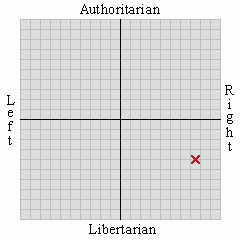Since (hopefully) I'm off to university in October, I have an interest in this - and the graduate tax is a bad, bad, bad idea. Alex Barker has 4 reasons against it on the FT Westminster blog, and I agree. It's a poorly thought out idea that punishes success.
We need to fund universities properly, yes, so they need more money. We also have to recognise what university is for - to educate people to a higher level, so they can do better in life. We also, in this, have to recognise the huge effect that university educated people have on our economy, especially certain sectors, and society.
I think, though imperfect, the current tuition fees system is the best way of funding universities - students actually understand that education is not 'free', and can rationally plan - "university education will cost £X but will let me earn £XX in the future, so it's worth paying for". A graduate tax removes this - and, I would say, actually makes people work less hard, as success in higher earnings will mean paying more tax in the future - and there is no limit on when you stop paying into the fund, since it is not linked to a particular price; this says to me that graduates are in fact paying for the next students to be educated, not themselves, and this culture is not to be encouraged. It's sort of the opposite of the state pension, and relying on something similar to a Ponzi scheme to fund university education is not sustainable at all.
Which brings me on to my second point - this isn't sustainable since there is always the emigration option - work abroad, earn money there - especially when tax rates are more favourable. I can see this having a particularly bad effect on the financial sector - do we really want to destroy the City, the one area we have a particularly strong comparative advantage in? Not really. Do we really want to lose, more to the point, the high earners, the ones who give a lot of value back to our economy, and provide our economy with so much tax revenue? Could, in fact, this graduate tax make other tax revenue fall, and in fact to a level where there is a net loss? Would this really be good for the country; would it really be 'fair' to make the non-university educated pay more tax because the university educated are working less hard, or have done a runner to Switzerland?
And I've looked at the long term - what about the short term? Universities need more money now, and if introduced, the graduate tax would mean the only revenues they'd get for 3 years would be contributions from alumni.
I think, to really hit the point though, I need to go back to that third paragraph - about pricing education. Education must be seen to have a real, tangible value - and a price. Students should get used to the real world of this, where people must consider that the benefit of something X but the cost Y, and if the benefit greatly exceeds the cost, then the investment is likely to be made. Same with university education. So what if students are left with debt? Welcome to the real world! It's not a bad kind of debt, like buying an Audi and three grand worth of clothes on credit, but an investment debt, rationally considered. It's right that students know how much their education is worth, and since they are the one who primarily benefits from it (higher earnings, etc), they should pay for it.
I realise that the paragraph above isn't perfect - what about those who wish to go into academia, etc? Perhaps universities could offer scholarships of some sort to those suitable, to fund them through undergrad, postgrad and doctorate, so they could produce research for the university - a beneficial investment for the university. We could also look at philanthropists in this, who would support students through university. There's also the issue of defaulting on student debts, and I think the current student loan system of paying back once you earn above £15k is about right there - since only the biggest waster would deliberately earn less as to 'free ride' through education at others' expense.
In any case, the graduate tax is still an ill-thought out and bad idea - and, however unpopular it might sound, raising tuition fees to fill the gap is a much better idea; it doesn't push students into poverty, it's an investment based on rational expectations of the future - and how is it right that the non-university educated have to pay for the university-educated? University education primarily benefits the student, why should they not pay for it?
Subscribe to:
Post Comments (Atom)





No comments:
Post a Comment
Comment on posts here, and all posts whether critical or in agreement are fine as long as they are not abusive. Comments are moderated due to Chinese spambots.